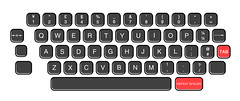National Novel Writing Month is over. As of last night. For me. I even have the purple bar to prove it.
I ran into a minor snag in this year's novel, the sort of thing I'd never had trouble with before: the novel ended early.1 Previous efforts, with the exception of 2004,2 were sprawling, endless messes that were even less resolved at the end of the month than they were when I'd started. It may sound interesting, but there's a deadening quality to it, an inertia to the whole story that's maddeningly difficult to overcome after the inevitable December writing rest. I haven't bothered to re-read the earlier semi-novels, let alone make any real effort at continuing from where I left off. I should, just to clip out the good bits, but...
Finding the worthwhile parts requires slogging, hip-deep or worse, through the rest of it. And there's a lot of the rest of it. Since I do it all on the typewriter, it's rife with spelling errors. As a stickler for spelling, it's tough to read, but when my fingers hit two keys in the wrong order,3 I just decide to live with it. Only the most gut-wrenching mistakes end up covered in a series of quickly-tapped xs.
Last year's novel took until midway through the fourth line before I hit a typo. This year, it's the eighth word.
That same spelling-error-retaining quality also prevents me from making use of a popular NaNoWriMo padding technique: going back to a part you've previously written and expanding upon it. Add some extra description or dialogue, or even an entirely new chapter. I can't do that. What's written is written, nearly set in stone, if you will. So, when the novel ended, and I counted up the last of the words, I needed to do something new.
I wrote a short story. It has nothing to do with the novel. It's its own, entirely self-contained entity, eight pages of refreshing change.
This year's novel is titled "Red Hawk Cemetery", changed from the original working title of "Ghost Town". It's a Western horror story, about a group of train robbers on the run from bounty hunters who end up in an isolated village in the Rockies. They all end up trapped in this halfway-abandoned village, hunted by grave-robbing monsters that lurk in the shadows. You know, pretty regular stuff. Guys try resolving violence with more violence, and end up done in by it. Pretty brutally, at that, but, hey, it's horror.
The short story, the extra words, is titled "Tin Robot". It's just a little story, not much more than a nugget of an idea, about a robot who moves in next door to a young couple. A big, boxy robot named, appropriately enough, Tin Robot.
Sharon commented that I must really like robots.4 I don't know that I do. I'm really more fascinated by them, as a handy symbol of technological dependence and omnipresence. Think Do Androids Dream Of Electric Sheep? by Philip K. Dick or Blade Runner, Ridley Scott's film adaptation. Or even better, find a copy of Dick's "The Electric Ant". It's a bizarre and wonderful short story about a man who discovers he's a robot and starts experimenting with himself. By monkeying with the input tape that controls his senses - this was back during computer punch-card days - he ends up warping (and destroying) reality.
I do know that I really like typewriters. One downside of using mine all month long is that I end up really confused about the locations of certain keys.5 Curious how mine stacks up against your regular keyboard layout? Here it is:

* * * * *
148,246 words, to be precise.
2I only made it about halfway that year, to somewhere just over 25,000 words.
3But not too close together, so that they get stuck. Sometimes, usually when I'm trying to type by, the force of the y key colliding with the returning b creates a ghost of a b beside the original. It's happened so many times that I'm starting to like it.
4The previous two novels both featured robots. 2004 had little robots as the gimmicky, halfway-pointless technology that consumer culture surrounds itself with, the equivalent of mobile phones and iPods; the main character's job was repairing them when they broke down. 2005's main character was a robot himself, but only realized this after a messy motorcycle crash. With no known precedent for it - no more robots around than we're used to today - he becomes obsessed, to the point of cutting himself open to study his robot-ness further.
5The same thing happens with foreign computer keyboards, when you're traveling. If you're gone for a long enough stint, you get the fun of being confused again when you travel home.

No comments:
Post a Comment